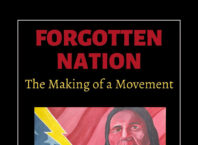By Lee Egerstrom
Thanks to a seed grant from a Minneapolis church congregation, the Indian Land Tenure Foundation (ILTF) has launched a new program to help Native groups recover land stolen from the tribes in earlier colonial times.
In effect, the “Beyond Land Acknowledgement Fund” started by ILTF is intended to be a conduit for churches, institutions, governmental units and other civic and nonprofit organizations to “put their money where their mouth is,” ILTF said in announcing the program.
The Little Canada-based national foundation provides legal resources and grants to help tribes across the U.S. recover important land resources and ancestral homeland territories.
Examples close to home include helping the Bois Forte Band of Chippewa recover more than 28,000 acres in the past year. In earlier work with the Leech Lake Band of Ojibwe, ILTF helped get Congress to approve the return of about 12,000 acres of its original land that is now in the works.
The stepped up effort through ILTF has come about with a boost from an unexpected source. Holy Trinity Lutheran Church in Minneapolis, which has an aggressive social ministry, had a group studying the Doctrine of Discovery theory that is the backbone of colonial conquest.
In practice, it means non-Christian indigenous people don’t count and thus don’t actually own their homelands. Land supposedly discovered by European Christian explorers could then be claimed as property by colonial powers.
This theory got locked up in practice and in national and international laws over the years. Growing public awareness of this has United Nations agencies and governments – including here and in Canada with its First Nations – struggling with ways to take corrective actions.
This global problem from colonial times is also the reason why the world now uses the term indigenous for native populations. It is at least an accurate term for a local people.
Holy Trinity’s Doctrine of Discovery Task Force, as the group was known, had meetings with staff at the Land Tenure Foundation for background starting in 2019. It then invited ILTF President Chris Stainbrook (Oglala Lakota) to speak about Indian land issues at a congregational meeting last fall.
When he finished, the Rev. Ingrid Arneson Rasmussen thanked him and handed him an envelope. “Here’s a little something to help you get land back,” Stainbrook recalls her saying.
“When I opened the envelope, I was in shock,” he said. It contained a check for $250,000.
With that, ILTF has started its Beyond Land Acknowledgement Fund.
Stainbrook said universities all across the country have become sensitized that they occupy stolen land. Other institutions have made similar acknowledgements, and some government units have as well. But just saying that you recognized you are on indigenous land is only words unless you do something constructive, Stainbrook said.
“These organizations do the acknowledgement and figure that lets them off the hook,” he said.
“It alleviates their guilt a little I guess. The organization gets nice press coverage, but it never results in any change in behavior or any land back to the tribes. There needs to be some sort of action taken or the land acknowledgement is meaningless,” he said in a statement launching the program.
This program now becomes a way for churches and groups to actually take steps to help, Stainbrook said. The fund “offers a vehicle for those entities that want to take that extra step and actually do something about returning land and making it right.”
This “extra step” is consistent for the Holy Trinity congregation. Located at 2730 E. 31st St. in Minneapolis, it shared an alley with MIGIZI until the native nonprofit youth organization’s facilities were burned and destroyed following the murder of George Floyd on May 25, 2020.
Kelly Drummer, MIGIZI president, was especially helpful in making Holy Trinity congregants aware of land issues, Rasmussen told The Circle. That, in turn, prompted the congregation to adopt the following statement it uses on its website and in church bulletins:
“We acknowledge that we gather on the Dakota Homeland.”
Rasmussen said about a dozen people took up indigenous land issues a few years back. “Kelly (Drummer) was who we went to with questions.”
The reference to being on Dakota Homeland is an appropriate statement for a church in Minneapolis, Rasmussen said, and especially so for a church in a neighborhood close to MIGIZI and many Native businesses and organizations.
The church’s social ministry is built around what it calls its Justice program.
This includes offering statements to guide personal lives and actions in “Caring for Creation,” citing the loss of biodiversity and environmental harm; “Immigration” and the need for all to assist vulnerable children and families; “Indigenous Rights,” as the statement and grant to ILTF attests; “LGBTQIA+,” in which Holy Trinity was an early church in welcoming people of all sexual orientations and genders; a “Palestine-Israel Working Group” consistent with the church’s Indigenous support everywhere; and an especially strong statement on “Racial Justice,” including ties to the George Floyd murder in its Longfellow Neighborhood (see links below.)
Putting words into action, Holy Trinity opened its doors and used it as a medic center during the demonstrations and rioting following the Floyd murder. It also became a center for food and medical supplies for neighborhood people caught in the chaos.
And, for more than 40 years, Holy Trinity has been a force in providing affordable housing in Minneapolis. It developed two apartment buildings on the church campus that houses about 135 people in affordable housing. A more recent mixed use building provides eight units of housing at market rates, eight units of affordable housing, and eight units for people with special needs.
Church members have also worked on 25 Habitat for Humanity home construction projects and have contributed to a Habitat for Humanity project in El Salvador.
In a strange case of what comes around, goes around, one of the church’s apartment projects needed major repairs. It was easier for a partner firm in that project to secure financing alone so Holy Trinity gave up its ownership stake.
“We actually got some funds unexpectedly,” Rasmussen said.
That was the source of the money that Holy Trinity passed along to ILTF.
The congregation didn’t want to use the money for ongoing church expenses, the pastor said. “They wanted it to go to some creative, useful purpose. So, it became what could be called a reparation payment,” she said.
That it has. The new Beyond Land Acknowledgement Fund allows ILTF to pool money to make land purchases, Stainbrook said.
Information about the Beyond Land Acknowledge Fund and Indian Land Tenure Foundation can be found at https://iltf.org.
Good background information about the Doctrine of Discovery Theory is available at https://doctrineofdiscovery.org/what-is-the-doctrine-of-discovery.
Holy Trinity Lutheran Church’s website and explanation of its Justice program can be found at https://htlcmpls.org.







